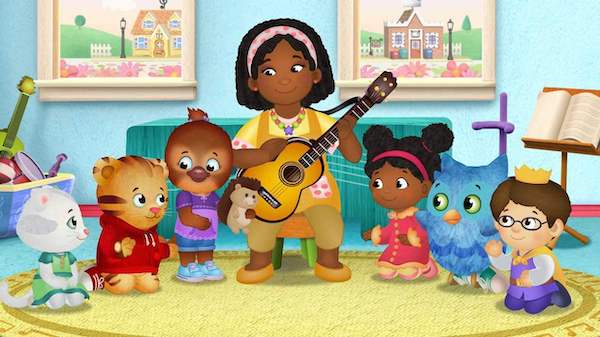Television Review: “Daniel Tiger’s Neighborhood” — A Well-Stocked Emotional Toolbox
By James Norton
Daniel Tiger’s Neighborhood has become one of our central gospels of child-rearing.

Learning lessons in Daniel Tiger’s Neighborhood. Photo: PBS.
When our son Joe was born a little over seven years ago, we did a brief survey of the television landscape to see what we were up against. We came into parenting with our eyes wide open, to some extent — walks, and books, and constructive toys, and puzzles, and visits with friends, and travels to see family would be (and have been) part of the kids’ lives, of course, but so would be afternoons where the general mandate was “just freakin’ cool your heels and watch some TV for a little while, PLEASE.”
A few shows popped right to the top of the list. Amazon’s Tumble Leaf, then just debuting, combined hipster craftsy whimsy with an inspiring sense of play and a gentle melancholy, all executed with masterful stop-motion animation. This, we thought, is the direction we’re going to go in with children’s television. Fireman Sam, by contrast, starring the titular character as a slightly dim but affable emergency worker in a town populated by utter halfwits, was clearly a plot to make British and American children less competitive in the global economy.
Daniel Tiger’s Neighborhood hovered somewhere in the middle. The successor to Mister Rogers’ Neighborhood, the show revolves around a classic nuclear family of tigers living in the Land of Make Believe, which is sort of a cross between a beachside suburb in California and the island from The Prisoner. Everything happens at a very child’s eye view, and the dynamics between Daniel and his friends Miss Elaina, Katerina Kittycat, O the Owl, and the semi-insufferable Prince Wednesday are the real drivers of the show’s action, which makes it like catnip for young viewers.
Its intentions seemed good, but the stories were simplistic, the music repetitive and sometimes grating, and the overall worldview — almost militaristic kindness and mutual respect — not exactly reflective of reality. We set it gently aside.
Now, seven years later and with a second child (nearly three) in the mix, Daniel Tiger’s Neighborhood has become one of our central gospels of child-rearing. (The others include the expression “make good choices,” lovingly mandatory bedtime stories, and the idea that any car trip over 30 minutes automatically includes screen time.)
Here’s the crux of it: Daniel Tiger’s Neighborhood isn’t really a show so much as it is a deep, thoughtfully stocked emotional toolbox. Those songs — so simple, sometimes so irritatingly memorable — are at the core of what it does, which is absolutely drill elegantly distilled, legitimately useful ideas into your kids’ tiny noggins (and into your own tired, weary, middle-aged noggin as well.)<
You gotta try new foods ’cause they might taste goooood!
Grown-ups… come back!
If you have to go potty, stop — and go right away! Flush and wash and be on your way!
When you’re sick… rest is best, rest is best.
Use your words… use your words!
And so forth. I didn’t have to Google around for those lyrics, and I didn’t rewatch any episodes of the show, because I know them cold. I know them cold because not only do I invoke some or all of them on a daily basis, but my kids use them, too.
The number of times a daycare drop-off has been made easier by our three or four-year-old quietly singing “grown-ups… come back!” to themselves is countless. The number of times we have gently admonished a grunting, huffing little tantrum monster to use his or her words is similarly massive. And the thing is, these little phrases can sometimes completely redraw the lines of conflict and help put parents and children on the same side, listening to one another and trying to resolve the struggle as a team.
And so Daniel Tiger’s Neighborhood is a balm for the day-to-day struggles of parenting, and a shockingly effective teaching tool for kids. More surprisingly, it’s a teaching tool for parents, too. The parental education component is a lot more stealthy — the parents on the show listen to their kids, they’re patient, and they’re always looking for ways to gently call out the real problem at the heart of their kids’ distress and address it constructively. You can only watch so many hours of that crap before it starts to rub off on you, and you realize that you, too, can redefine daily struggles in a way that puts you and your kid on the same team.
The show has other appealing qualities, among them the fact that the families it depicts include all sorts of parenting units including single parents, a family led by a grandma and a mom, a biracial marriage, and a 60-something monarch who married a new 30-something wife, presumably after some kind of divorce or mysterious death.
But when we finally get to the other side of the heavy lift that is parenting young kids, the thing that will stick with us about Daniel Tiger’s Neighborhood is that — simple, gentle, predictable plots notwithstanding — it’s a cunningly crafted piece of culture that serves a truly good purpose. There aren’t many shows out there (with or without animated tigers and owls) that can make that claim with a straight face. And regardless of who you are and whether you happen to have children, the next time you freak out and do an emotional core dump, remember: Use your words… use your words!
James Norton edits the Heavy Table, a culinary newsletter documenting the Upper Midwest. He has contributed to the Washington Post, McSweeney’s Internet Tendency, and National Geographic online, among other publications. He lives in Minneapolis with his wife, two kids, and three semi-feral miniature panthers.

#success!
Much thanks James for sharing our message..and sweat
xo
Angela Santomero
Daniel Tiger’s Neighborhood (creator)